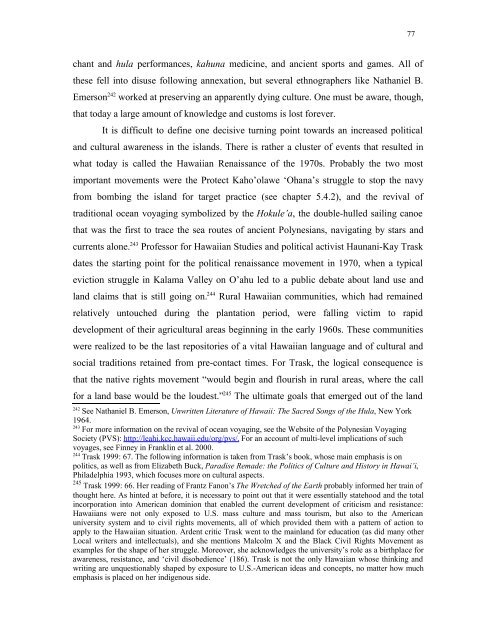A Paradise Lost - KOPS - Universität Konstanz
A Paradise Lost - KOPS - Universität Konstanz
A Paradise Lost - KOPS - Universität Konstanz
You also want an ePaper? Increase the reach of your titles
YUMPU automatically turns print PDFs into web optimized ePapers that Google loves.
chant and hula performances, kahuna medicine, and ancient sports and games. All of<br />
these fell into disuse following annexation, but several ethnographers like Nathaniel B.<br />
Emerson 242 worked at preserving an apparently dying culture. One must be aware, though,<br />
that today a large amount of knowledge and customs is lost forever.<br />
It is difficult to define one decisive turning point towards an increased political<br />
and cultural awareness in the islands. There is rather a cluster of events that resulted in<br />
what today is called the Hawaiian Renaissance of the 1970s. Probably the two most<br />
important movements were the Protect Kaho’olawe ‘Ohana’s struggle to stop the navy<br />
from bombing the island for target practice (see chapter 5.4.2), and the revival of<br />
traditional ocean voyaging symbolized by the Hokule’a, the double-hulled sailing canoe<br />
that was the first to trace the sea routes of ancient Polynesians, navigating by stars and<br />
currents alone. 243 Professor for Hawaiian Studies and political activist Haunani-Kay Trask<br />
dates the starting point for the political renaissance movement in 1970, when a typical<br />
eviction struggle in Kalama Valley on O’ahu led to a public debate about land use and<br />
land claims that is still going on. 244 Rural Hawaiian communities, which had remained<br />
relatively untouched during the plantation period, were falling victim to rapid<br />
development of their agricultural areas beginning in the early 1960s. These communities<br />
were realized to be the last repositories of a vital Hawaiian language and of cultural and<br />
social traditions retained from pre-contact times. For Trask, the logical consequence is<br />
that the native rights movement “would begin and flourish in rural areas, where the call<br />
for a land base would be the loudest.” 245 The ultimate goals that emerged out of the land<br />
242 See Nathaniel B. Emerson, Unwritten Literature of Hawaii: The Sacred Songs of the Hula, New York<br />
1964.<br />
243 For more information on the revival of ocean voyaging, see the Website of the Polynesian Voyaging<br />
Society (PVS): http://leahi.kcc.hawaii.edu/org/pvs/. For an account of multi-level implications of such<br />
voyages, see Finney in Franklin et al. 2000.<br />
244 Trask 1999: 67. The following information is taken from Trask’s book, whose main emphasis is on<br />
politics, as well as from Elizabeth Buck, <strong>Paradise</strong> Remade: the Politics of Culture and History in Hawai’i,<br />
Philadelphia 1993, which focuses more on cultural aspects.<br />
245<br />
Trask 1999: 66. Her reading of Frantz Fanon’s The Wretched of the Earth probably informed her train of<br />
thought here. As hinted at before, it is necessary to point out that it were essentially statehood and the total<br />
incorporation into American dominion that enabled the current development of criticism and resistance:<br />
Hawaiians were not only exposed to U.S. mass culture and mass tourism, but also to the American<br />
university system and to civil rights movements, all of which provided them with a pattern of action to<br />
apply to the Hawaiian situation. Ardent critic Trask went to the mainland for education (as did many other<br />
Local writers and intellectuals), and she mentions Malcolm X and the Black Civil Rights Movement as<br />
examples for the shape of her struggle. Moreover, she acknowledges the university’s role as a birthplace for<br />
awareness, resistance, and ‘civil disobedience’ (186). Trask is not the only Hawaiian whose thinking and<br />
writing are unquestionably shaped by exposure to U.S.-American ideas and concepts, no matter how much<br />
emphasis is placed on her indigenous side.<br />
77

















